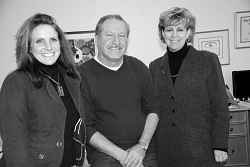Services agency reaches out to new immigrants

SALT LAKE CITY — Lisa Marie Church, executive director of the Department of Human Services for the State of Utah has given her offices a vital, new mission. They are to make special efforts to meet the needs of their many clients in the clients’ first language. "I know the ideal situation would be that everyone who comes through our doors speaks English," Church said in and interview with the Intermountain Catholic. "But that simply isn’t the reality we’re dealing with. We are seeing growing numbers of immigrants and refugees who are being resettled in Utah, and they need out help, just as many of our American and native-born Utahns need our help. "Unfortunately, if language is a barrier, people can fall through the cracks," Church said. "We don’t want that to happen to anyone. These people are in need, and we are here to meet those needs, regardless of what language they speak." It takes the fingers of both hands to count the number of non-English languages with which the Department of Human Service staff members deal. In most cases, they can find staff members familiar enough with the varied languages to translate for them. Currently, non-English speaking Hispanic/Latino clients make up the largest group in need. "It isn’t that we need translators," Church said. "We can usually find plenty of people who can translate for us. What we need is outreach programs in Spanish presented by Spanish speakers. That is our goal." To meet that goal, Church has hired Manuel Romero as director of community relations for the agency. Romero is bi-lingual and as sensitive to the needs of Cambodian refugees as he is to those who speak Spanish and English. "The Department of Human Services tries to maintain a continuum of services; we try to meet all the needs of our clients no matter how varied those needs may be," Romero said. "We have so many offices dealing with issues of aging, disabilities, families, children, and financial issues, like recovery of support funds. In the Hispanic culture, people have different ways of dealing with government agencies." Romero told of clients who were dealing with "sandwich" issues. They were caring for their school-age children and their elderly parents at the same time, and the stress was beginning to affect the marriage negatively. "The parents didn’t know about the aging services we offer," Romero said. "They really became the family’s life saver once we could explain it all to them. There are a lot of families out there we could help if we had effective outreach in Spanish." Church and Liz Sollis, public information officer for the Department of Human Services agree that among Spanish-speaking members of the community there often is a suspicion of the government, especially if there are family members who lack the proper documentation. "Generally, we don’t check for documentation except when we are dealing with Medicare issues," Church said. "And most of the services we provide don’t involve Medicare." Romero said any outreach efforts make it clear that services provided by the Department of Human Services are provided by public funds, and he emphasizes that the Office of Child Protective Services, for example, is concerned mainly for the child and the preservation of the family. "The Office of Disabilities could be involved with Medicare," Church said, "but the Hispanic community is pretty sophisticated about issues of disability." Church said when she talks to the public and members of the legislature, she assures them that the Department of Human Services would not be an agency of good business if it was concerned only with part of the community they serve. "In order to be a healthy agency, and to do good business, we must serve every aspect of this very vibrant community. We are here to try to keep families intact without government intervention, so we must be able to communicate with every ethnic group in the community. We try to approach everyone with compassion, and we try to work well with other agencies, like the Department of Child and Family Services, the Juvenile Justice, System, Catholic Community Services, and Holy Cross Ministries to help us meet the needs of every client we have." New immigrants and newly settled refugees have not taken advantage of the services offered by the Department of Human Services, Church said. "Rather, they are desperate for our services and the services of other agencies with whom we work. Right now, our outreach emphasis is on Spanish-speakers, but the time will come when we will need outreach to the Tongan, Samoan, Vietnamese, Russian, Eastern European, Burmese, and Somali-Bantu communities as well. For further information on the Department of Human Services, call 538-4171.
© Copyright 2024 The Diocese of Salt Lake City. All rights reserved.

Stay Connected With Us